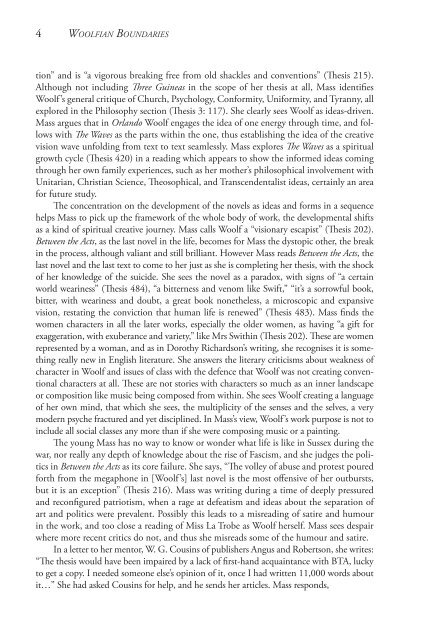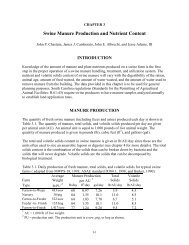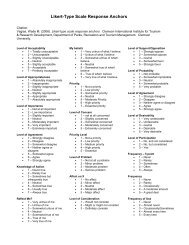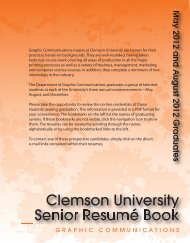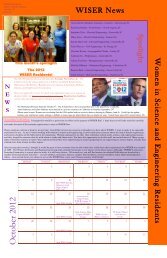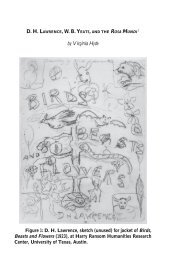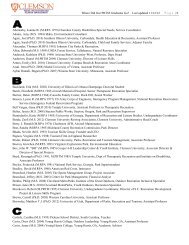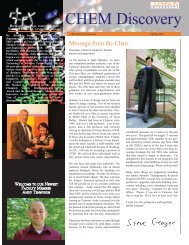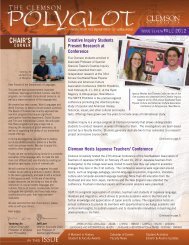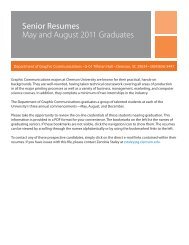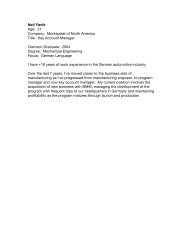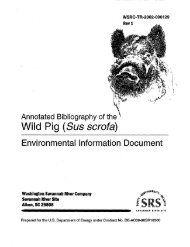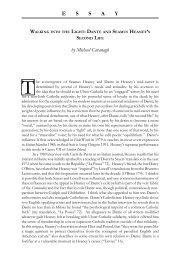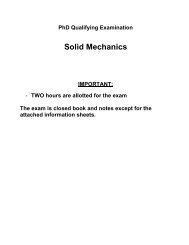Woolfian Boundaries - Clemson University
Woolfian Boundaries - Clemson University
Woolfian Boundaries - Clemson University
Create successful ePaper yourself
Turn your PDF publications into a flip-book with our unique Google optimized e-Paper software.
4 WOOLFIAN BOUNDARIES<br />
tion” and is “a vigorous breaking free from old shackles and conventions” (Th esis 215).<br />
Although not including Th ree Guineas in the scope of her thesis at all, Mass identifi es<br />
Woolf’s general critique of Church, Psychology, Conformity, Uniformity, and Tyranny, all<br />
explored in the Philosophy section (Th esis 3: 117). She clearly sees Woolf as ideas-driven.<br />
Mass argues that in Orlando Woolf engages the idea of one energy through time, and follows<br />
with Th e Waves as the parts within the one, thus establishing the idea of the creative<br />
vision wave unfolding from text to text seamlessly. Mass explores Th e Waves as a spiritual<br />
growth cycle (Th esis 420) in a reading which appears to show the informed ideas coming<br />
through her own family experiences, such as her mother’s philosophical involvement with<br />
Unitarian, Christian Science, Th eosophical, and Transcendentalist ideas, certainly an area<br />
for future study.<br />
Th e concentration on the development of the novels as ideas and forms in a sequence<br />
helps Mass to pick up the framework of the whole body of work, the developmental shifts<br />
as a kind of spiritual creative journey. Mass calls Woolf a “visionary escapist” (Th esis 202).<br />
Between the Acts, as the last novel in the life, becomes for Mass the dystopic other, the break<br />
in the process, although valiant and still brilliant. However Mass reads Between the Acts, the<br />
last novel and the last text to come to her just as she is completing her thesis, with the shock<br />
of her knowledge of the suicide. She sees the novel as a paradox, with signs of “a certain<br />
world weariness” (Th esis 484), “a bitterness and venom like Swift,” “it’s a sorrowful book,<br />
bitter, with weariness and doubt, a great book nonetheless, a microscopic and expansive<br />
vision, restating the conviction that human life is renewed” (Th esis 483). Mass fi nds the<br />
women characters in all the later works, especially the older women, as having “a gift for<br />
exaggeration, with exuberance and variety,” like Mrs Swithin (Th esis 202). Th ese are women<br />
represented by a woman, and as in Dorothy Richardson’s writing, she recognises it is something<br />
really new in English literature. She answers the literary criticisms about weakness of<br />
character in Woolf and issues of class with the defence that Woolf was not creating conventional<br />
characters at all. Th ese are not stories with characters so much as an inner landscape<br />
or composition like music being composed from within. She sees Woolf creating a language<br />
of her own mind, that which she sees, the multiplicity of the senses and the selves, a very<br />
modern psyche fractured and yet disciplined. In Mass’s view, Woolf’s work purpose is not to<br />
include all social classes any more than if she were composing music or a painting.<br />
Th e young Mass has no way to know or wonder what life is like in Sussex during the<br />
war, nor really any depth of knowledge about the rise of Fascism, and she judges the politics<br />
in Between the Acts as its core failure. She says, “Th e volley of abuse and protest poured<br />
forth from the megaphone in [Woolf’s] last novel is the most off ensive of her outbursts,<br />
but it is an exception” (Th esis 216). Mass was writing during a time of deeply pressured<br />
and reconfi gured patriotism, when a rage at defeatism and ideas about the separation of<br />
art and politics were prevalent. Possibly this leads to a misreading of satire and humour<br />
in the work, and too close a reading of Miss La Trobe as Woolf herself. Mass sees despair<br />
where more recent critics do not, and thus she misreads some of the humour and satire.<br />
In a letter to her mentor, W. G. Cousins of publishers Angus and Robertson, she writes:<br />
“Th e thesis would have been impaired by a lack of fi rst-hand acquaintance with BTA, lucky<br />
to get a copy. I needed someone else’s opinion of it, once I had written 11,000 words about<br />
it…” She had asked Cousins for help, and he sends her articles. Mass responds,


